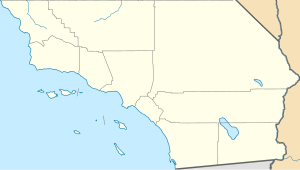The Painted Cave Fire was a devastating wildfire in June, 1990 that burned in the Santa Ynez Mountains and the city of Santa Barbara, within Santa Barbara County, California.
| Painted Cave Fire | |
|---|---|
| Date(s) |
|
| Location | Santa Ynez Mountains, Santa Barbara County, California |
| Coordinates | 34°30′N 119°47′W / 34.50°N 119.79°W |
| Statistics[1] | |
| Burned area | 5,000 acres (2,023 ha; 8 sq mi; 20 km2) |
| Impacts | |
| Deaths | 2 |
| Structures destroyed | 427 |
| Ignition | |
| Cause | Arson |
| Perpetrator(s) | Leonard Ross |
| Map | |
The fire, which began near Painted Cave, was intentionally set near the intersection of Highway 154 (San Marcos Pass Road) and Painted Cave Road, burned 5,000 acres (20 km2), destroyed 427 buildings, and resulted in two deaths.[1]
Progression
editThe day had already been a long one for the Santa Barbara County Fire Department which had battled a 3-alarm fire in the county dump.[2] While still mopping up from the dump fire, the call went out at 6:02 p.m. for a brush fire on Highway 154 and Painted Cave Road.[3] On this Wednesday evening temperatures topped off at 109 °F (43 °C) degrees, an all-time record for that date, fueling some of the worst sundowner winds ever recorded.[3] The first engine arrived on scene at 6:05 p.m. and was met with winds gusting over 40 miles per hour (64 km/h) with about 2 acres (0.81 ha) actively burning.[2] Less than 20 minutes later, the fire had traveled over 2 miles (3.2 km) and flames were reaching 70 feet (21 m) into the air.
The fire proceeded into residential neighborhoods of Santa Barbara, fueled by sundowner winds, eventually jumping U.S. Route 101 at 7:42PM. In less than two hours the fire had traveled nearly 4 miles (6.4 km), destroying 430 structures and killing one person. It was the largest loss of structures since the Bel Air Fire of 1961.[4] The state fire marshal called it the "fastest-moving fire of its type ever in the United States."[5]
There were two fatalities in the fire. Andrea Lang Gurka, age 37, died while fleeing the flames along San Marcos Pass Road. An unnamed state prisoner working as a firefighter also died.[6][7]
Investigation and settlement
editVery quickly after the fire started, investigators determined that the blaze was the work of an arsonist and were able to trace it back to its origin. From there, however, the case ran cold and sat unsolved for over 5 years. The case was reopened in 1995 when Peggy Finley, a former girlfriend to Leonard Ross, told her minister that Ross had confessed to igniting the fire in an attempt to "burn out his neighbor" but the fire "got out of hand."[8] After an investigation of Ross, Santa Barbara County District Attorney Thomas W. Sneddon, Jr. decided not to file criminal charges saying that the case against Ross was too weak. However, Ross then sued the county for investigating him and the county saw an opening. A countersuit was filed accusing Ross of starting the fire and the jury ruled in the county's favor, 9-3.[8]
See also
editReferences
edit- ^ a b Aguilar, David (27 June 2015). "A look back at the Painted Cave Fire on the 25th Anniversary". KSBY. Retrieved 26 August 2015.
- ^ a b Dalton, Keith; Rigdon, Joan (1 Jan 2013). "The Paint Fire 1990". Santa Barbara News-Press. Retrieved 27 August 2015.
- ^ a b Cappon, Sally (26 June 2015). "Horror of Painted Cave Fire Rekindled 25 Years Later". Noozhawk. Retrieved 27 August 2015.
- ^ "The East Bay Hills Fire" (PDF). Federal Emergency Management Agency. October 1991. Retrieved 27 August 2015.
- ^ Johnson, John (7 November 2000). "A Final Flare-Up From Disastrous 1990 Fire". LA Times. Archived from the original on January 25, 2016. Retrieved 27 August 2015.
- ^ Roderick, Kevin; Reed, Mack (29 June 1990). "Santa Barbara: A Hellish Night Of Terror". Seattle Times. Retrieved 30 November 2020.
- ^ Bernstein, Robert (27 June 2020). "Painted Cave Fire 30th Anniversary". Seattle Times. Retrieved 30 November 2020.
- ^ a b Johnson, John (4 December 2000). "Man Ordered to Pay $2.75 Million for Painted Cave Fire". LA Times. Retrieved 26 August 2015.
